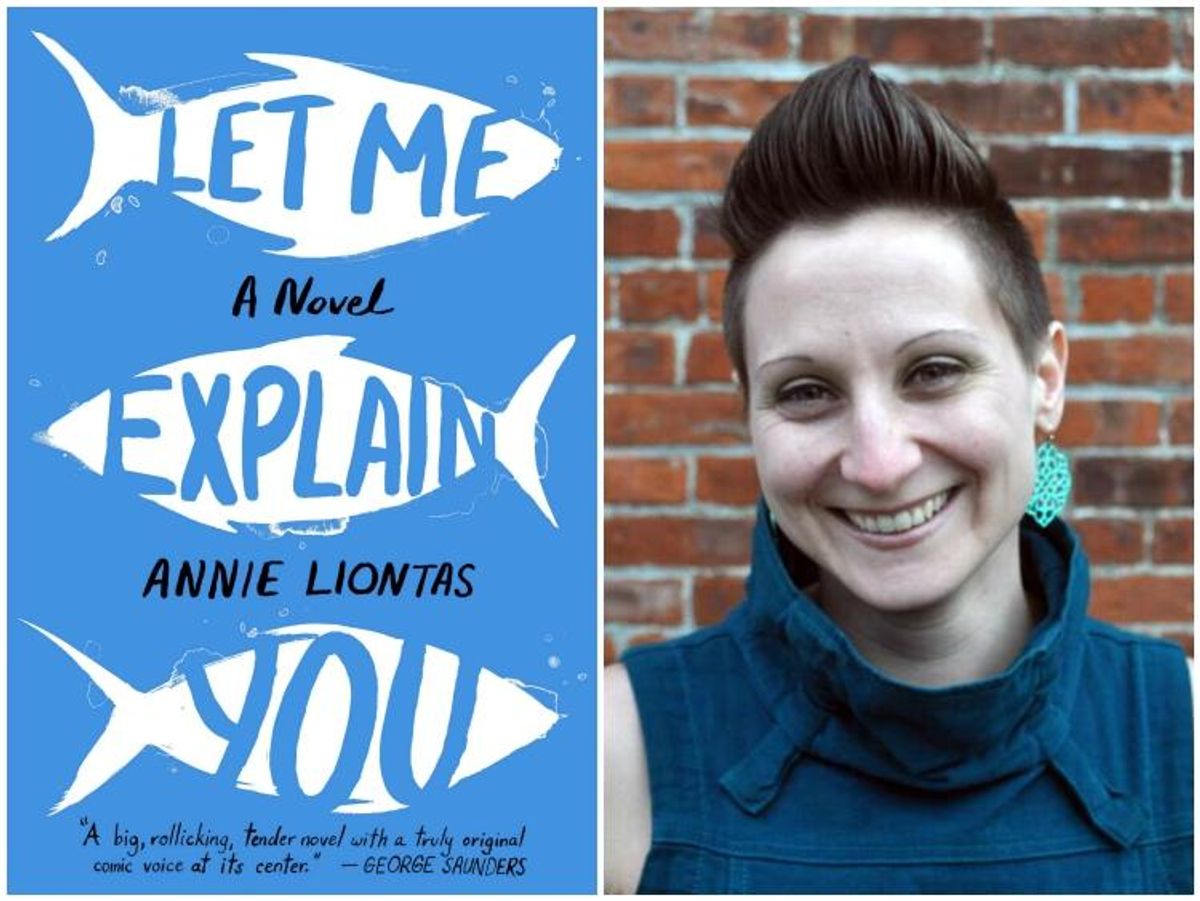Let Me Explain You, the title of Annie Liontas' dubut novel, is Stavros Stavros Mavrakis go-to phrase when dealing with the many women in his life. With his patriarchal dominance having been repeatedly flouted by his two ex-wives and three daughters, the Greek immigrant and entrepreneur decides to take what he sees as his last opportunity to put them on the right track. Convinced that he only has 10 day to live, Stavros sends an email to them all, pointing out their many flaws and not-so-graciously telling them how to correct them -- sparking varying levels of backlash.
It's a strange and thoroughly engaging story, one that deals with an array of issues -- from immigration to cultural clashes, gayness, family, and food-- so Out spoke with Liontas about the motivations behind Let Me Explain You, how her family deals with her being married to a woman, and, of course, the vittles.
Out: How did this novel emerge? Where was the impetus?
Annie Liontas: You know, it sort of came like lightning one day. This man is going to die, and he wants to tell his daughters and his ex-wife how they are failing at life. That part came suddenly, the rest of it was pretty grueling. I had to figure out the voices of these people, who was going to take up more space in the book--it all got pretty complicated. But I'm gay, and I knew immediately that one of the daughters was going to be, too, that that would be one of the issues in the book. Greek culture is very patriarchal, as I've experienced. My father did have difficulty with my sexuality in the beginning... You know, lesbianism is in direct opposition to patriarchy, so I just knew that had to be incorporated.
Overall, what are Greek attitudes toward being gay these days?
Things are definitely changing, but it's all closely tied to gender expectations. It's a culture where women are meant to be mothers and wives. They're educated, but they're still expected to come home and be mothers. The last time I was in Athens, I remember there was a gay bar, so there's been a shift. But I haven't really been able to go visit family lately because I'm now married to a woman, and it's not really welcome.
The immigrant experience is so central to this novel, why was it important to have that be at the heart?
The truth is, I don't have an accent. I'm assimilated. I lost a lot of my language and had to learn as an adult, but I've always had the experience--and I couldn't explain it for a long time--of feeling foreign. Honestly, it was as much about my sexuality as about being an immigrant. It's sort of the same experience. And it was something that, I feel, my life has been shaped around. I recall having to learn English, I recall the cultural shift--there's this concept in the book called xenitia which is a very Greek term that's described the feeling of being a stranger in a new land. That feeling just stuck with me. It came over me at such a formative age.
Immigration is a hot topic right now, in the United States, in Europe, and are growing tensions over ideas of assimilation and integration. Did you have any of that in mind when it came to writing this book?
I think a lot about immigration. Of course, the hot debate on Latino and Mexican immigration is very different from Greek immigration, it's just a completely different conversation. But of course I think about it, but it's like what Toni Morrison says, "If there's a book that you want to read, but it hasn't been written yet, then you must write it." A lot of immigrant narratives look at the generation that has primarily been the immigrant, like the Stavros character, or they look at first or first-and-a-half generations. They're also usually male accounts. I felt like, actually, there's a particular kind of inheritance for women, daughters, and also for sons of immigrants. It's a kind of breaking away from old world values that happens. The experience of that inheritance, I wanted to see that in a book, the sort of acknowledgement of what that experience is like--the weight of the immigrant and what that weight is like on a daughter or a son.
Stavros is such a dynamic character, what was it like embodying him, taking on such a unique voice?
He's a handful. Initially when I thought of the idea, I had my mind made up about it, that he was this older, self-aggrandizing bastard. And if you're a writer, you can't make your mind up about a character, or they're dead in the water. He had to teach me a lot of lessons, really, just of humility in a writer and understanding the full existence of a character and and of people, and that was really a great experience. In the beginning, though, he wasn't funny at all, he was just really brooding, and I had to change that. I hit that little phrase, Let Me Explain You, and so much opened up to me, for him. The multiple registers of his voice, the humor that the reader can share. I'm kind of poking fun at him, but never really entirely. At some level you're listening to him, even knowing he can be quite ridiculous, if only for the sake of the women around him. He's very polarizing, I find that people either they love him or they almost hate the book because of him.
Greek food plays a huge part in the story since Stavros runs a Greek diner, and his gay daughter Stavroula is a chef. What is the Greek relationship to food in your view?
It's a really powerful relationship. I think that food in Greek culture is particulalry important because it's become a way to hold onto it. You may lose your language in a new world, but you can keep on making Greek food. So many emmigrating Greeks open up diners or cafes. It's a way to bring this cultural artifact with you, and then it's a way for people like me who have lost the language to really hold onto this heritage and inheritance. In the book, and in my own life, food serves so many purposes. It's sort of magical in its role. It can help people with nothing turn their lives into something, and then it's a way for characters who are alientated to connect. It's also a way to woo a woman, and it would probably work on me. I wouldn't call food a character, but it's really a form of dialogue in the book.
And what about your personal relationship with Greek food?
My family is a mix of Greeks and Italians, so food is pretty integral to our lives. We would make food together. My father is a welder, so he made this spit for us to roast a lamb, and we'd use it every Easter. We were like the only Greek family around for a few miles, so people would slow down, and be like, What the hell is happening? What are they roasting? Is it a body? [Laughs]. No one knew what was going on. I have a lot of memories like that. I've worked a few jobs in food service, but I'm an educator, I'm not a trained chef, so I think food must have imprinted itself on me from a very young age, Greek food in particular.
You've been getting great reviews, what have overall reactions been?
In general, people have been really very generous. I feel like people get the book, they get its humor. It feels like a particularly American story, so I'm not sure what that means for it, but I feel so lucky. And people have really cool ideas for it. There's this guy with a blog out of California, called Drinks with Nick, and he made a drink based on Stavros, which I thought was amazing! I think he put like every Greek flavor he could think in it [laughs], but that's the best kind of reaction, when people take something and make it their own, and it sort of stays with them.
I teamed up with this chef at a local restaurant, and we came up with a menu inspired by the novel and served it. It was so cool, it felt like the book was coming to life in a way that readers could really connect with. Even in the last couple of days since reviews have come out, I've gotten really touching emails from the diaspora, like a Greek-American literature professor in California and a Greek artist in the Bahamas -- there's actually a huge Bahemian population of Greek community -- so I might go out there in the spring and do a reading. In the Bahamas of all places! Which is really cool.
Let Me Explain You is available now.




















































































